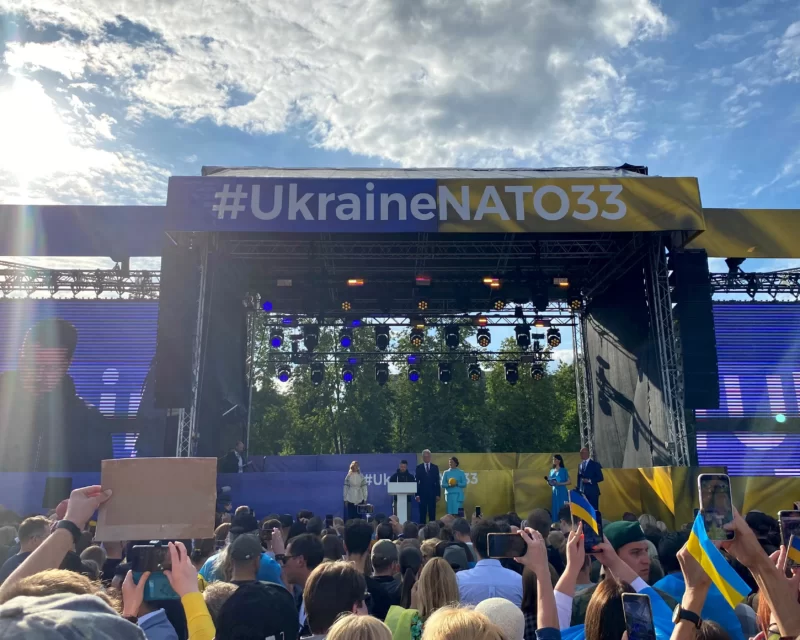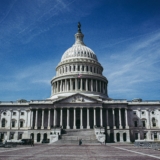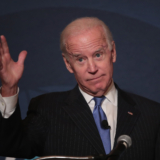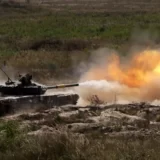Partisan Divide Emerges on NATO and Ukraine as U.S. Nears Critical Policy Decisions
As leaders gather in Vilnius for the NATO summit, the issue of NATO’s future and U.S. support for Ukraine is revealing a growing partisan divide among Americans. While strong support for NATO persists across the nation, partisan differences are becoming increasingly pronounced and could have significant implications for future U.S. policy decisions, particularly if certain Republican candidates secure the presidency in 2025.
A pre-summit survey commissioned by NATO indicates that 52% of Americans believe NATO contributes to their safety and security, with 65% expressing a willingness to defend another NATO member under attack. Additionally, a substantial 64% of respondents believe that the U.S. should remain a member of NATO, while only 13% are opposed. A separate survey conducted by the New Europe Center reveals that 59% of Americans support inviting Ukraine to join NATO, either immediately (46%) or once the ongoing conflict ends (13%).
However, these figures mask significant partisan differences. Pew Research Center found that although 62% of Americans hold broadly favorable views of NATO, the partisan gap is substantial. Democrats approve of NATO by a wide margin of 54 points (76% to 22%), whereas Republicans are evenly split, with 49% expressing approval and 49% expressing disapproval.
The partisan divide extends to attitudes about the war in Ukraine. A Gallup survey conducted in June indicates that 62% of respondents support continued U.S. assistance to Ukraine in its quest to regain lost territory, even if it means a prolonged conflict. In contrast, 36% prefer to end the war as soon as possible. Notably, Republicans favor a swift end to the conflict by a margin of 49% to 47%, even if it means Russia retains its conquered territory. Meanwhile, 79% of Democrats support Ukraine’s efforts to reclaim its lost territories, with only 19% opposed. A narrower majority of independents (55% to 43%) also favor supporting Ukraine’s territorial claims.
Another Pew Research Center study, released on June 15, underscores the widening partisan gap regarding the level of U.S. aid provided to Ukraine. While 28% of Americans believe the current level of aid is excessive, 47% view it as appropriate (31%) or insufficient (16%). However, a substantial 44% of Republicans perceive the support as excessive, compared to just 14% of Democrats. This gap has grown significantly since the onset of the conflict in February 2022, expanding from 4 percentage points in March 2022 to 30 points in June 2023. A recent Reuters/Ipsos poll also revealed that 48% of Republicans believe that Ukraine’s problems are not the U.S.’s concern and should not be interfered with, and 44% oppose military aid, with 61% rejecting financial aid.
Despite the overall majority’s support for Ukraine, optimism about the war’s outcome remains low. Gallup reports that a substantial 57% of respondents believe neither side is winning, with only 12% favoring Russia and 30% favoring Ukraine. Even among Democrats, only 45% believe Ukraine is winning, while 48% believe neither side is prevailing. The fate of U.S. support for Ukraine may depend on the outcome of the current Ukrainian counteroffensive and whether it breaks the apparent stalemate.
As the U.S. presidential election approaches, these partisan divides on foreign policy are taking center stage. Pew’s findings reveal that 60% of Democrats believe it is in the country’s best interest to be actively engaged in world affairs, while 39% favor concentrating on domestic issues. In contrast, 71% of Republicans argue for a focus on domestic problems, with only 29% supporting an active international role for the United States. The 2024 election will determine whether these differences signal a significant shift in U.S. foreign policy, akin to the transformation of the Republican Party’s isolationist stance after World War II.






